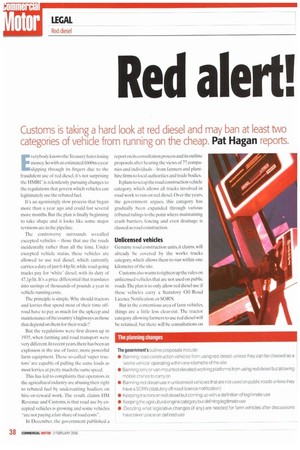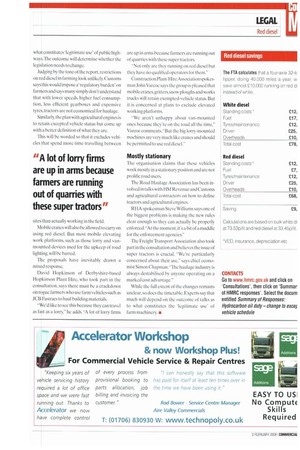Red a ern
Page 38

Page 39

If you've noticed an error in this article please click here to report it so we can fix it.
Customs is taking a hard look at red diesel and may ban at least two
categories of vehicle from running on the cheap. Pat Hagan reports.
Everybody knows theTreasury hates losing monev.So with an estimated I:600m a year slipping through its fingers due to the fraudulent use of red diesel. it's not surprising the HMRC is relentlessly pursuing changes to the regulations that govern which vehicles can legitimately use the rebated fuel.
It's an agonisingly slow process that began more than a year ago and could last several more months. But the plan is finally beginning to take shape and it looks like some major revisions are in the pipeline.
The controversy surrounds so-called excepted vehicles those that use the roads incidentally rather than all the time. Under excepted vehicle status, these vehicles are allowed to use red diesel, which currently carries a duty of just 6.-1-lpflit, while road-going trucks pay for 'white' diesel, with its duty of 47.1p/lit. It's a price differential that translates into savings of thousands of pounds a year in vehicle running costs.
The principle is simple. Why should tractors and lorries that spend most of their time offroad have to pay as much for the upkeep and maintenance of the country's highways as those that depend on them for their trade?
But the regulations were first drawn up in 1935. when farming and road transport were very different, hi recent years,there has been an explosion in the use of faster, more powerful farm equipment. These so-called 'super tractors' are capable of pulling the same loads as most lorries. at pretty much the same speed.
This has led to complaints that operators in the agricultural industry are abusing their right to rebated fuel by undercutting hauliers on hire-or-reward work. 'Ilie result, claims I IM Revenue and Customs, is that road use by excepted vehicles is growing and some vehicles "are not paying a fair share of road costs".
In December, the government published a report on its consultation process and its outline proposals after hearing the views of 77 companies and individuals from farmers and planthire firms to local authorities and trade bodies.
It plans toscrap the road construction vehicle category, which allows all trucks involved in road work to run on red diesel. Over the years. the government argues, this category has gradually been expanded through various tribunal rulings to the point where maintaining crash barriers. fencing and even drainage is classed ZINad construction.
Unlicensed vehicles
Genuine road construction units, it claims, will already be covered by the works trucks category. which allows them to run within one kilometre of the site.
Customs also wants to tighten up the rules on unlicensed vehicles that are not used on public roads.The plan is to only allow red diesel use if these vehicles carry a Statutory Off-Road Licence Notilication.or SO RN.
But in the contentious area of farm vehicles. things are a little less clear-cut. The tractor category allowing farmers to use red diesel will he retained, but there will be consultations on
what constitutes legitimate use' of public highways.The outcome will determine whether the legislation needs to change.
Judging by the tone of the report,restrictions on red diesel in farming look unlikely. Customs says this would impose a 'regulatory burden' on farmers and says many simply don't understand that with lower speeds, higher fuel consumption, less efficient gearboxes and expensive tyres. tractors are not economical for haulage.
Similarly.the plan with agricultural engines is to retain excepted vehicle status but come up with a better definition of what they are.
This will be worded so that it excludes vehicles that spend more time travelling between sites than actually working in the field.
Mobile cranes will also be allowed to carry on using red diesel. But most mobile elevating work platforms, such as those lorry and vanmounted devices used for the upkeep of road lighting, will be barred.
The proposals have inevitably drawn a mixed response.
David Hopkinson of Derbyshire-based Hopkinson Plant I lire, who took part in the consultation, says there must be a crackdown on rogue farmers who use farm vehiclessuch as JCB Fastracs to haul building materials.
"We'd like to see this because they can travel as fast as a lorry." he adds. "A lot of lorry firms are up in arms because farmers are running out of quarries with these super tractors.
"Not only are they running on red diesel but they have no qualified operators for them."
Construction Plant-Hire Association spokesman John Varcoe says the group is pleased that mobile cranes.gritters.snow ploughs and works trucks will retain exempted-vehicle status. But it is concerned at plans to exclude elevated working platforms.
"We aren't unhappy about van-mounted ones because they're on the road all the time," Varcoe comments. "But the big lorry-mounted machines are very much like cranes and should he permitted to use red diesel."
Mostly stationary
.the organisation claims that these vehicles work mostly in a stationary position and are not prolific road users.
The Road Haulage Association has been involved in talks with HM Revenue and Customs and agricultural contractors on how to define tractors and agricultural engines.
RI A spokesman Steve Williams says one of the biggest problems is making the new rules clear enough so they can actually be properly enforced."At the moment, it's a bit of a muddle for the enforcement agencies."
The Freight Transport Association also took part in the consultation and believes the issue of super tractors is crucial. "We're particularly concerned about their use." says chief economist Simon Chapman."The haulage industry is always destabilised by anyone operating on a marked cost advantage."
While the full extent of the changes remains unclear, so does the timetable. Experts say that much will depend on the outcome of talks as to what constitutes the 'legitimate use' of farm machinery. •




























































































































































































